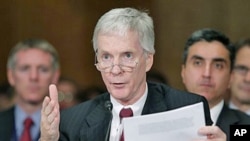Members of the U.S. Senate Foreign Relations Committee are expressing skepticism about the success of nation-building in Afghanistan, as a two-year congressional report is released, citing only limited results from America's massive financial aid to the country.
One influential senator is calling on the president to withdraw at least 15,000 U.S. troops from Afghanistan by the end of this year.
The Senate Foreign Relations Committee held a confirmation hearing for President Barack Obama's nominee to become the next U.S. ambassador to Afghanistan, Ryan Crocker. The veteran diplomat has served in a number of countries in the region, including Pakistan, and was U.S. Ambassador to Iraq from 2007 to 2009.
The 61-year-old Crocker said he knows what he is getting himself into if he is confirmed.
"Thank you, Senator," he said. "I am under no illusions of the difficulty of the challenge. If Iraq was hard, and it was hard, Afghanistan in many respects is harder."
All of the senators on the panel recognized Crocker's stellar record, but most of them said they did not envy him taking this post in Afghanistan at a time when the president is coming under increasing pressure from lawmakers from both major political parties to reduce the extent of the costly U.S involvement in Afghanistan. Republican Senator James Risch of Idaho put it like this.
"What we are trying to give to the Afghan people, and have worked at for 10 years, and given them in blood, sweat and tears, you really, really wonder whether they want what we are trying to give them," he said. "And if they do not want what we are trying to give, it is not going to work."
Outside the Senate, Armed Service Committee Chairman Carl Levin called for Obama to withdraw at least 15,000 U.S. troops from Afghanistan by the end of 2011.
The president has promised to begin withdrawing some of the estimated 90,000 U.S. troops in Afghanistan this July, paving the way for a gradual end to military operations in the country by the end of 2014. He has not specified how many troops he would remove this year.
Crocker acknowledged that there are major challenges in Afghanistan, including government corruption. But he said the United States could never again allow Afghanistan to become a safe haven for terrorists, from which they can attack the United States.
"As Secretary of Defense [Robert] Gates has noted, we walked away from Afghanistan once in 1989, with disastrous consequences," he said. "We cannot afford to do so again."
|
VOA's Ira Mellman discussed the report on Daybreak Asia with Michael Semple, Fellow at the Carr Center for Human Rights Policy at the Harvard Kennedy School.
|
The hearing occurred the same day the Senate Foreign Relations committee released a report saying U.S. foreign aid to Afghanistan has only had limited success in promoting sustainable stability. Afghanistan has received more than $18 billion in U.S. foreign aid during the past 10 years - more than any other country, including Iraq.
The report cautioned that foreign aid can result in corruption, and can create an inflationary war-time economy. It warned that Afghanistan could suffer a severe economic depression when foreign troops leave the country in 2014, unless there is proper planning to phase out aid slowly, over time.
Even Senate Foreign Relations Committee Chairman John Kerry, who has supported the president's Afghan policy, made clear there are going to have be changes in the amount of U.S. aid and the number of U.S. troops deployed there.
"While the United States has genuine national security interests in Afghanistan, our current commitment in troops and in dollars, is neither proportional to our interest, nor sustainable in my judgment," said Kerry.
Crocker said U.S. financial aid to Afghanistan has produced some real results, citing education and basic health services. He said more than 7 million Afghan children are in school, and more than 2 million of them are girls, who were prohibited from attending school under the Taliban. He said in considering the hard financial realities, he would never do anything that would put at risk half of the Afghan population - women and girls.
Kerry said he expects Crocker to be confirmed quickly by the Senate so that he can take up his tough job in Kabul.




